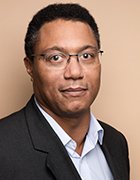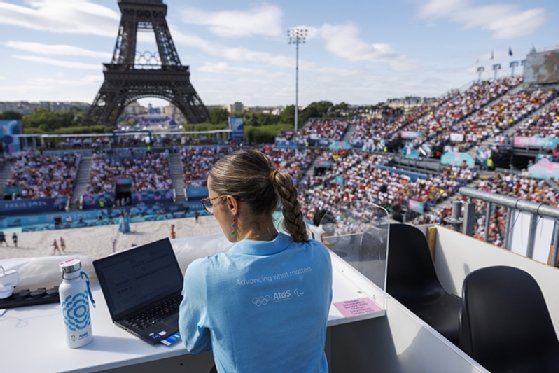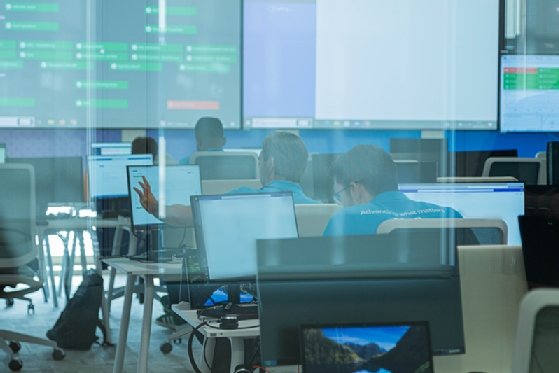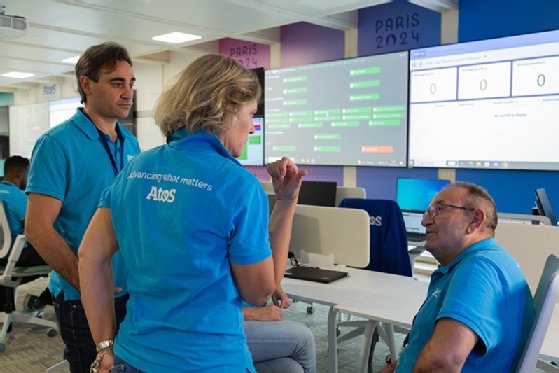You know the technology behind the Olympic and Paralympic Games is in good hands when it’s run by a former athletics world record holder and three-time Olympian.
Bruno Marie-Rose, chief information and technology officer of the Paris 2024 Organising Committee for the Olympic and Paralympic Games, is not your average digital leader. He speaks to Computer Weekly just a month after his team delivered the technology systems for a hugely successful Games. It’s a great accolade to add to his CV – but it’s not the only achievement that stands out during his stellar career.
Marie-Rose is a former sprinter, an Olympic medallist and a member of the French team that set a world record in the 4x100m relay in 1990. He excelled as much on the track as he does today in the IT department. His athletic background means he has first-hand experience of how support mechanisms, such as IT, are crucial to delivering successful sporting events. However, his route to the top involved a challenging journey on and off the track.
“I had the opportunity to study at the same time as my athletics career,” he says. “My only difficulty was to cope with both activities at the same time. In the first year of my studies, I participated in my first Olympics, so I had to organise myself to ensure it was possible to do both. My journey has been about doing IT management and sports from the beginning until now, and I hope in the future as well.”
Marie-Rose got his first taste of IT management in sports early in his technology career. Not long after retiring from sprinting, he was appointed technology director for the Paris 2003 Athletics World Championships. Even during his subsequent IT leadership career in consulting and finance, Marie-Rose maintained an interest in athletics.
He was president of Ligue Nationale d’Athlétisme until July 2018, when he was appointed CIO for Paris 2024. “Having this job is a dream objective where I’m mixing what I was supposed to do with what I want to do,” he says. “After a long career in the finance industry, it was great to join the Organising Committee and work behind the scenes on technology.”
Becoming Paris 2024 CIO
Marie-Rose went through a series of interviews where he proved his IT leadership credentials. “My boss, the CEO of Paris 2024, was very transparent,” he says. “He said, ‘I know what you’ve done. I know what you can do. But for each job, I will select the best.’ I’m proud to say it was another challenge I overcame to be selected as CIO.”
Six years later, Marie-Rose is able to look back on his achievements with pride. When he joined in July 2018, one of his colleagues was already in situ and had set up computers and mobile devices for Paris as a candidate city for the Games. By the end of Paris 2024, more than 5,400 people had helped establish the IT backbone of the event.
“Those six years went very quickly,” he says. “The journey was interesting. Each year, we had specific objectives. My first objective was to support the Organising Committee by providing computers, mobiles and information systems.”

“All the ingredients that helped make the Games successful were started as early as possible, including working with Atos. It would not have been possible, starting from scratch, to have all the different skills and competencies and to deliver what we have delivered. The Atos team has experience delivering IT for the Games in other cities”
Bruno Marie-Rose, Olympic and Paralympic Games Organising Committee
Marie-Rose says he was surprised to discover that Paris 2024 didn’t have financial or human resources systems. Establishing an IT strategy for those service areas meant his role at the Games was similar to that of a traditional CIO. However, there was one major difference.
“One of the key success factors was that we were very involved in working on the Paris 2024 vision. During the first two years, we had strong governance with the other functional areas to share the vision and ensure we were defining the vision across the organisation. We knew the first objective was to deliver the Games and ensure the athletes had the best environment to perform,” he says.
“But at the same time, we were bold. We wanted the technology to accompany the vision in different areas, like innovation, sustainability, legacy and fan experience – all these little ingredients. Our part in the successful delivery of the Games was due to being part of the vision at the early stage of the Organising Committee’s work.”
Building great partnerships
Marie-Rose says successful preparatory work for the Games extended to his team’s work alongside technology partner Atos. From the beginning, both parties worked effectively on key areas, such as developing digital experiences for sports fans around the globe.
“All the ingredients that helped make the Games successful were started as early as possible, including working with Atos,” he says. “It would not have been possible, starting from scratch, to have all the different skills and competencies and to deliver what we have delivered. The Atos team has experience delivering IT for the Games in other cities.” Atos was also the technology partner for the men’s European Football Championship in Germany earlier in the summer.
As the key technology partner for the Olympics and Paralympics, Atos had 300 staff on-site and coordinated a team of 15 other technology partners, comprising more than 2,000 experts. Marie-Rose says his IT staff and Atos’s experts worked as one team.

“They give us good advice about what we have to do and what we don’t have to do, which is very important when you need to make a decision,” he says. “Everything comes down to trust. When you know your partner is managing the fundamentals of the operation, it gives you some mental availability to think about what would make the Games successful.”
The IT infrastructure for Paris 2024 included 150 key applications, such as critical systems like the Olympic Management System and Olympic Diffusion System, which ensured centralised interaction between athletes, coaches, commentators, fans and partners. Another crucial element was the technology behind the accreditation and commentator information systems.
Having a trusted partner for IT infrastructure meant Marie-Rose and his team had more room to explore digital innovation. He draws attention to audio descriptions for deaf sports fans and the introduction of Vision Pad, a tablet system for blind people to follow the event. Marie-Rose says this collective effort led to increased digitisation in key areas.
“For the first time, we had a 100% digital ticketing system,” he says. “It was a bet at the beginning to say, ‘Will it work? Will we be able to rely on the technology?’ But by the end, it worked. We focused on the digital aspect – engaging the French population and international fans and making them feel part of the Games.”
Innovating in exciting areas
Marie-Rose says the key to success was focusing on innovations that added value to the Games, such as using 5G networks and advanced camera technologies on boats on the River Seine during the Olympic Games opening ceremony. Tried-and-trusted technologies are crucial to running the Games effectively, but so is pushing sport into exciting new areas.
“Innovation was not about showcasing the technology for tomorrow,” he says. “For us, innovation was about putting in place concrete projects that were pushing the objectives of Paris 2024 forward. It was, therefore, crucial that IT was involved in every initiative of the Organising Committee to ensure we provided the best services.”

Marie-Rose says one of the key challenges was ensuring Paris 2024’s shift to 100% cloud-based platforms was as straightforward and successful as possible. This shift was important because IT professionals could be released to work on other projects.
An important challenge involved data storage and General Data Protection Regulation (GDPR) compliance. Marie-Rose gives the example of working with Chinese technology specialist Alibaba, a partner of the International Olympic Committee that provides crowd and e-commerce services. His team had to ensure that systems were compliant and non-European professionals could not access data.
The solution involved hosting personal and sensitive data with Atos to ensure Games systems were 100% compliant with GDPR and the requirements of the French government. Christophe Thivet, chief integrator officer for Paris 2024 at Atos, says the solution involves a careful hybrid blend of private and public cloud technologies.
“This was an effective infrastructure that we reviewed with the Organising Committee to support their strategies,” he says. “We know part of the success factor is establishing one team spirit, sustained by integrating all partners in a single process. So, all the partners involved know each other very well.”
Marie-Rose also believes the approach with Atos and other technology partners will pay long-term dividends. “I think the Organising Committees of future Games are thinking about what we achieved,” he says. “That appreciation is not only from a technology point of view. It’s also about how we managed to make business and government people globally talk to each other, and we were in the middle of this governance.”
Creating a long-term legacy
Marie-Rose says innovation isn’t the only area of technology improvement. His team and its partners have developed a sustainable IT programme to ensure the technology footprint of the Games is minimised. That area is his immediate focus in the aftermath of the Games. “At the moment, we’re focused on recovering and reconditioning,” he says.
Another key part of the event’s legacy is education. His team is passing on sustainability lessons to other CIOs in France. They’re also sharing best practice evidence on cyber security preparations. “My objective in terms of legacy is to say what will last in terms of technology – and it’s not about the equipment, it’s about the approach and methods to ensure people can progress in the different domains,” he says.

Marie-Rose says his team is focused on a strong knowledge transfer programme. The benefits of this approach will be reaped by the people running Los Angeles 2028. “For me, we must be providing real added value and material growth to the future Organising Committees,” he says.
With the Games complete and Marie-Rose working on establishing his long-term legacy, does he believe he’s worthy of another medal for IT achievements to match his athletic accomplishments? “Yes, for sure – we should be proud of the level of performance,” he says, suggesting a gold medal for digital leadership depends on enduring success.
“I always focus on what we could have done better and where we could improve for the next Games. It’s a continuous improvement process to ensure we are motivated for the next challenge. We must ensure we transmit the knowledge to help others improve again.”
